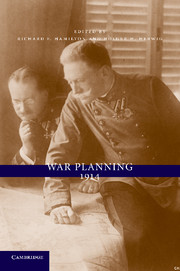Book contents
- Frontmatter
- Contents
- List of Maps
- Contributors
- Acknowledgments
- 1 War Planning: Obvious Needs, Not So Obvious Solutions
- 2 Austria-Hungary
- 3 German War Plans
- 4 War Planning and Initial Operations in the Russian Context
- 5 France
- 6 Great Britain
- 7 Italy
- 8 Conclusions
- Appendix: Suggested Reading
- Index
- References
Appendix: Suggested Reading
Published online by Cambridge University Press: 27 January 2010
- Frontmatter
- Contents
- List of Maps
- Contributors
- Acknowledgments
- 1 War Planning: Obvious Needs, Not So Obvious Solutions
- 2 Austria-Hungary
- 3 German War Plans
- 4 War Planning and Initial Operations in the Russian Context
- 5 France
- 6 Great Britain
- 7 Italy
- 8 Conclusions
- Appendix: Suggested Reading
- Index
- References
Summary
On Wars: General
Archer, Christon, John Ferris, Holger H. Herwig, and T. H. E. Travers. World History of Warfare. Lincoln and London: University of Nebraska Press, 2002.
Black, Jeremy. Why Wars Happen. New York: New York University Press, 1998. Blainey, Geoffrey. The Causes of War. New York: Free Press, 1988.
Kagan, Donald. On the Origins of Wars and the Preservation of Peace. New York: Doubleday, 1995.
Rotberg, Robert I., and Theodore K. Rabb, eds. The Origin and Prevention of Major Wars. Cambridge, MA, and London: Harvard University Press, 1988.
Stoessinger, John G. Why Nations Go to War. New York: St. Martin's Press, 1993.
- Type
- Chapter
- Information
- War Planning 1914 , pp. 257 - 262Publisher: Cambridge University PressPrint publication year: 2009



